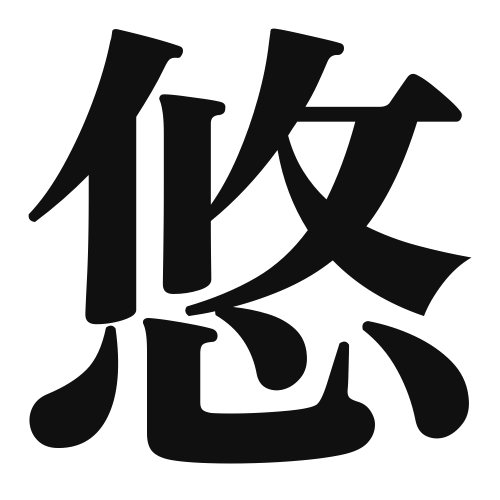1. Overview of Meaning
The kanji “悠” (yuu) generally means “distant,” “leisurely,” or “calm.” It conveys a sense of tranquility and a relaxed pace of life, often associated with a long-lasting or profound quality.
2. Formation and Radical
Formation of the Kanji: The kanji “悠” is a phono-semantic compound (形声文字), which means it combines both a phonetic and a semantic component. The left part, “亘,” suggests a sense of extending or spanning, while the right part, “尤,” contributes to the pronunciation.
Radical: The radical for “悠” is “亘” (wataru), which relates to the idea of crossing or spanning over a distance.
3. Examples of Usage
Common Words and Phrases:
- 悠久 (yuu-kyuu) – eternal, everlasting
- 悠然 (yuuzen) – calm, leisurely
Example Sentences in Daily Conversation:
- 彼は悠然とした態度で問題に対処した。
(He dealt with the problem in a calm and leisurely manner.) - この川は悠久の流れを持っている。
(This river has an eternal flow.)
4. Synonyms and Antonyms
Similar Kanji:
- 静 (shizu) – quiet, calm (focuses more on silence rather than the leisurely aspect)
- 長 (naga) – long (refers to length but not necessarily to tranquility)
Antonyms:
- 急 (kyuu) – urgent, hurried (indicates a sense of haste and lack of calm)
- 騒 (sawagu) – noisy, tumultuous (contrasts with the calmness of “悠”)
5. Cultural and Historical Background
Relation to Japanese Culture: The concept of “悠” is often reflected in traditional Japanese aesthetics, which value tranquility and a connection to nature. It is associated with the idea of taking time to appreciate the beauty around us.
Proverbs and Idioms:
- 悠久の時を超えて (yuu-kyuu no toki o koete) – transcending eternal time, often used to express timelessness in art or nature.
